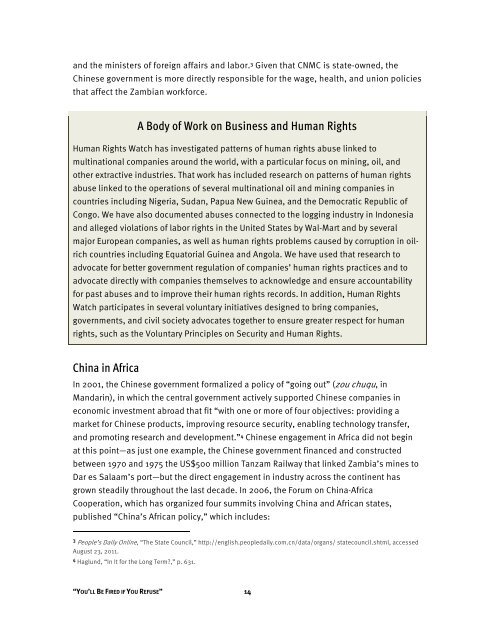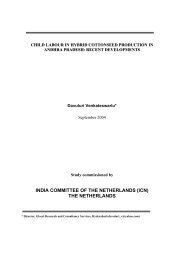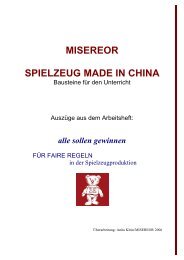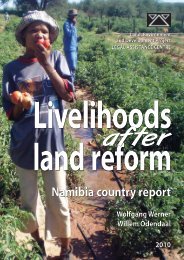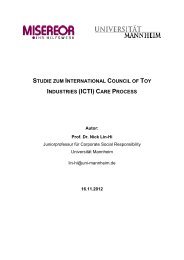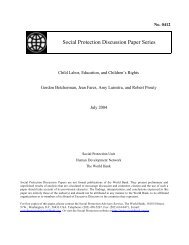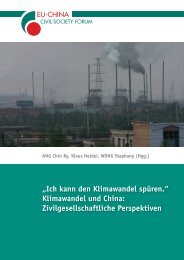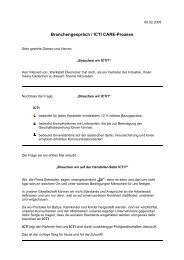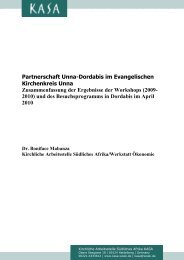“You'll Be Fired if You Refuse†- Human Rights Watch
“You'll Be Fired if You Refuse†- Human Rights Watch
“You'll Be Fired if You Refuse†- Human Rights Watch
Create successful ePaper yourself
Turn your PDF publications into a flip-book with our unique Google optimized e-Paper software.
and the ministers of foreign affairs and labor. 3 Given that CNMC is state-owned, the<br />
Chinese government is more directly responsible for the wage, health, and union policies<br />
that affect the Zambian workforce.<br />
A Body of Work on Business and <strong>Human</strong> <strong>Rights</strong><br />
<strong>Human</strong> <strong>Rights</strong> <strong>Watch</strong> has investigated patterns of human rights abuse linked to<br />
multinational companies around the world, with a particular focus on mining, oil, and<br />
other extractive industries. That work has included research on patterns of human rights<br />
abuse linked to the operations of several multinational oil and mining companies in<br />
countries including Nigeria, Sudan, Papua New Guinea, and the Democratic Republic of<br />
Congo. We have also documented abuses connected to the logging industry in Indonesia<br />
and alleged violations of labor rights in the United States by Wal-Mart and by several<br />
major European companies, as well as human rights problems caused by corruption in oilrich<br />
countries including Equatorial Guinea and Angola. We have used that research to<br />
advocate for better government regulation of companies’ human rights practices and to<br />
advocate directly with companies themselves to acknowledge and ensure accountability<br />
for past abuses and to improve their human rights records. In addition, <strong>Human</strong> <strong>Rights</strong><br />
<strong>Watch</strong> participates in several voluntary initiatives designed to bring companies,<br />
governments, and civil society advocates together to ensure greater respect for human<br />
rights, such as the Voluntary Principles on Security and <strong>Human</strong> <strong>Rights</strong>.<br />
China in Africa<br />
In 2001, the Chinese government formalized a policy of “going out” (zou chuqu, in<br />
Mandarin), in which the central government actively supported Chinese companies in<br />
economic investment abroad that fit “with one or more of four objectives: providing a<br />
market for Chinese products, improving resource security, enabling technology transfer,<br />
and promoting research and development.” 4 Chinese engagement in Africa did not begin<br />
at this point—as just one example, the Chinese government financed and constructed<br />
between 1970 and 1975 the US$500 million Tanzam Railway that linked Zambia’s mines to<br />
Dar es Salaam’s port—but the direct engagement in industry across the continent has<br />
grown steadily throughout the last decade. In 2006, the Forum on China-Africa<br />
Cooperation, which has organized four summits involving China and African states,<br />
published “China’s African policy,” which includes:<br />
3 People’s Daily Online, “The State Council,” http://english.peopledaily.com.cn/data/organs/ statecouncil.shtml, accessed<br />
August 23, 2011.<br />
4 Haglund, “In It for the Long Term?,” p. 631.<br />
“YOU’LL BE FIRED IF YOU REFUSE” 14


